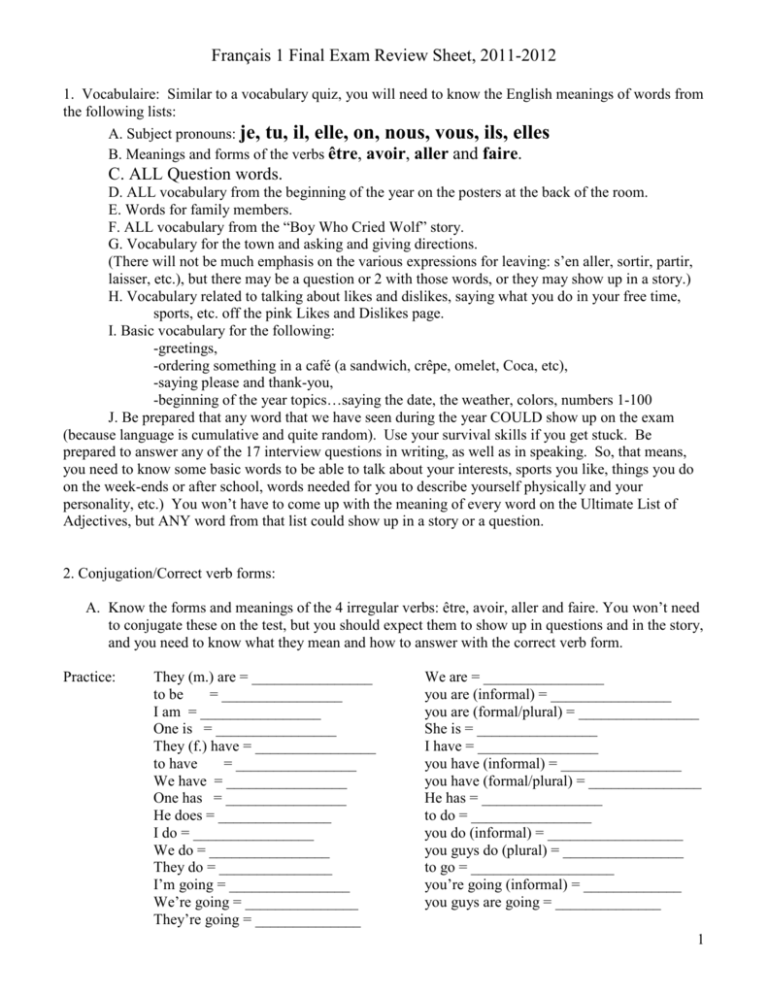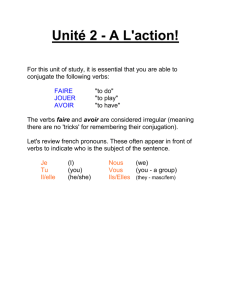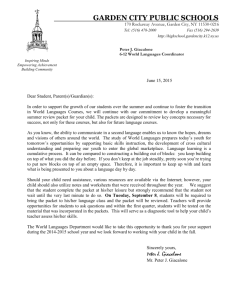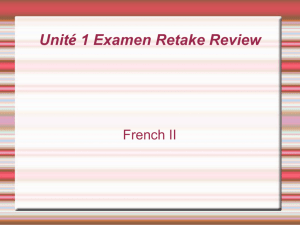A. Subject pronouns: je, tu, il, elle, on, nous, vous, ils, elles
advertisement

Français 1 Final Exam Review Sheet, 2011-2012 1. Vocabulaire: Similar to a vocabulary quiz, you will need to know the English meanings of words from the following lists: A. Subject pronouns: je, tu, il, elle, on, nous, vous, ils, elles B. Meanings and forms of the verbs être, avoir, aller and faire. C. ALL Question words. D. ALL vocabulary from the beginning of the year on the posters at the back of the room. E. Words for family members. F. ALL vocabulary from the “Boy Who Cried Wolf” story. G. Vocabulary for the town and asking and giving directions. (There will not be much emphasis on the various expressions for leaving: s’en aller, sortir, partir, laisser, etc.), but there may be a question or 2 with those words, or they may show up in a story.) H. Vocabulary related to talking about likes and dislikes, saying what you do in your free time, sports, etc. off the pink Likes and Dislikes page. I. Basic vocabulary for the following: -greetings, -ordering something in a café (a sandwich, crêpe, omelet, Coca, etc), -saying please and thank-you, -beginning of the year topics…saying the date, the weather, colors, numbers 1-100 J. Be prepared that any word that we have seen during the year COULD show up on the exam (because language is cumulative and quite random). Use your survival skills if you get stuck. Be prepared to answer any of the 17 interview questions in writing, as well as in speaking. So, that means, you need to know some basic words to be able to talk about your interests, sports you like, things you do on the week-ends or after school, words needed for you to describe yourself physically and your personality, etc.) You won’t have to come up with the meaning of every word on the Ultimate List of Adjectives, but ANY word from that list could show up in a story or a question. 2. Conjugation/Correct verb forms: A. Know the forms and meanings of the 4 irregular verbs: être, avoir, aller and faire. You won’t need to conjugate these on the test, but you should expect them to show up in questions and in the story, and you need to know what they mean and how to answer with the correct verb form. Practice: They (m.) are = ________________ to be = ________________ I am = ________________ One is = ________________ They (f.) have = ________________ to have = ________________ We have = ________________ One has = ________________ He does = _______________ I do = ________________ We do = ________________ They do = _______________ I’m going = ________________ We’re going = _______________ They’re going = ______________ We are = ________________ you are (informal) = ________________ you are (formal/plural) = ________________ She is = ________________ I have = ________________ you have (informal) = ________________ you have (formal/plural) = _______________ He has = ________________ to do = ________________ you do (informal) = __________________ you guys do (plural) = ________________ to go = ___________________ you’re going (informal) = _____________ you guys are going = ______________ 1 Français 1 Final Exam Review Sheet, 2011-2012 B. 3. Conjugation/Correct endings of verbs: Be able to conjugate a verb from each group of regular verbs WITHOUT using the posters. These will likely be verbs that you have never seen, but you will know whether it is an –er, -ir or –re verb. cracher- to spit Je Nous Tu Vous Il/Elle/On Ils/Elles 1) Que veut dire, “tu craches”? ________________, _________________, or ________________ 2) « _______ _____________ » veut dire, « They spit », « They are spitting », or « They do spit”. 3) Comment dit-on, “We don’t spit.”? _______________________________________________ punir- to punish Je Nous Tu Vous Il/Elle/On Ils/Elles confondre- to confuse (mix up two things) Je Nous Tu Vous Il/Elle/On Ils/Elles 3. Know which verb/verb form makes sense. Choose the correct verb form that goes in the sentence. This will be a combination of Regular –er verbs and forms of être and avoir. 1) Ils __________________ la télévision. A. regardons B. regarde C. regarder D. regardent E. regardez 2) Vous _________________ très sympathique ! A. avez B. sont C. êtes D. est E. suis 3) Est-ce que tu ____________ beaucoup de devoirs ? A. es B. as C. a D. est E. avoir 2 Français 1 Final Exam Review Sheet, 2011-2012 4. Questions Personnelles: First translate the question to English, then answer using a complete sentence in French, and the correct form of the underlined verb. English examples: Where are you? I am in class. What do you watch on T.V.? I watch “Hawaii 5-0”. 1. Quels animaux est-ce que tu as? Translation of the QUESTION: Response: 2. Quels sports est-ce que tu aimes? Translation: Response: 3. Qu’est-ce que tu as en commun avec ta famille ? Vous êtes tous (all) comment? Idiots ? Drôles ? Translation: Response: 4. Qu’est-ce que tu fais avec tes amis? Ex. Vous jouez à un sport ensemble? Vous allez où ensemble? Translation: Response: (Watch out! Unless you all DO homework together, you will NOT answer with the verb faire in the original question, such as “Nous faisons…” Instead, say at least ONE thing that you all do together, such as “We watch movies at my house.”) 5. Tu vas où après la classe? Translation: Response: 3 Français 1 Final Exam Review Sheet, 2011-2012 6. Listening: a. You will hear 5 new words in French. The words will be spelled for you. Write the words and spell them correctly. b. Listen to a short story and summarize it in English. c. Listen to a French person describe him/herself. Write down the basic information that you hear about them: name, age, family members, where they are from, what they like to do, etc. 7. Reading directions, following a map. Look at a map and follow directions around a town. Answer questions about the map (similar to the questions about the map of Villeneuve). 8. Reading comprehension: Read a short story using familiar words and translate it to English. The story will have a few new words that you should try to use context clues to figure out the meaning of. 9. Read a story, article or description and answer questions about it. The story may be about an unfamiliar topic, but it will use both familiar words and new words. The new words may be defined for you on the test or they may be words that look like English, or you will have enough context clues necessary to figure out the meaning or the new words may be insignificant to understanding the meaning of the story. 10. Writing: Write a story using 10 different verbs (action words such as crie, arrête, veut manger, mange, prend, s’ennuie, raconte, dit, rit, etc.) 11. Speaking: Conversation. Answer and ask questions from the 17 Interview Questions. You may NOT use the paper. A) You will be asked 3 or 4 of the interview questions. You may also be asked a follow up question. B) Use your survival skills if you don’t understand or don’t know how to answer. Answer as completely as possible. Say as much as you can, and try to use complete sentences. C) You will also need to ask me a question in French. You may ask me any one of the questions on the sheet or a different question of your choosing. Be sure to ask me using the VOUS form of the question. The reading and writing sections of the exam will be given on a different day than the rest of the exam. It will be given either the day of the Senior exam OR one of the last 2 days of class before exams. 4











